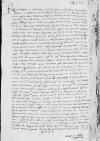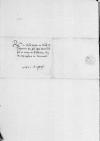Letter #2191
Ioannes MAGNUS to Ioannes DANTISCUSVenice, 1539-07-13
| received [1539]-08-26 Manuscript sources:
Auxiliary sources:
Prints:
| ||||||||||||||||||||||||||||||||||
Text & apparatus & commentaryPlain textText & commentaryText & apparatus
Reverendissimo in Christo Patri et Domino, domino
Reverendissime in Christo Pater et Domine, domine frater et benefactor humanissime. Salutem et sinceram mei commendationem.
Veniens ad me in praeterito mense Iunio optime spei adulescens
Ex
Reverendissimae
D(ominationi) or D(ominationis)⌈D(ominationi)D(ominationi) or D(ominationis)⌉ Vestrae deditissimus
Postscript:
Rogatus a me noster
Atque interim felicissime valeat.



 UUB, H. 154, f. 10v
UUB, H. 154, f. 10v